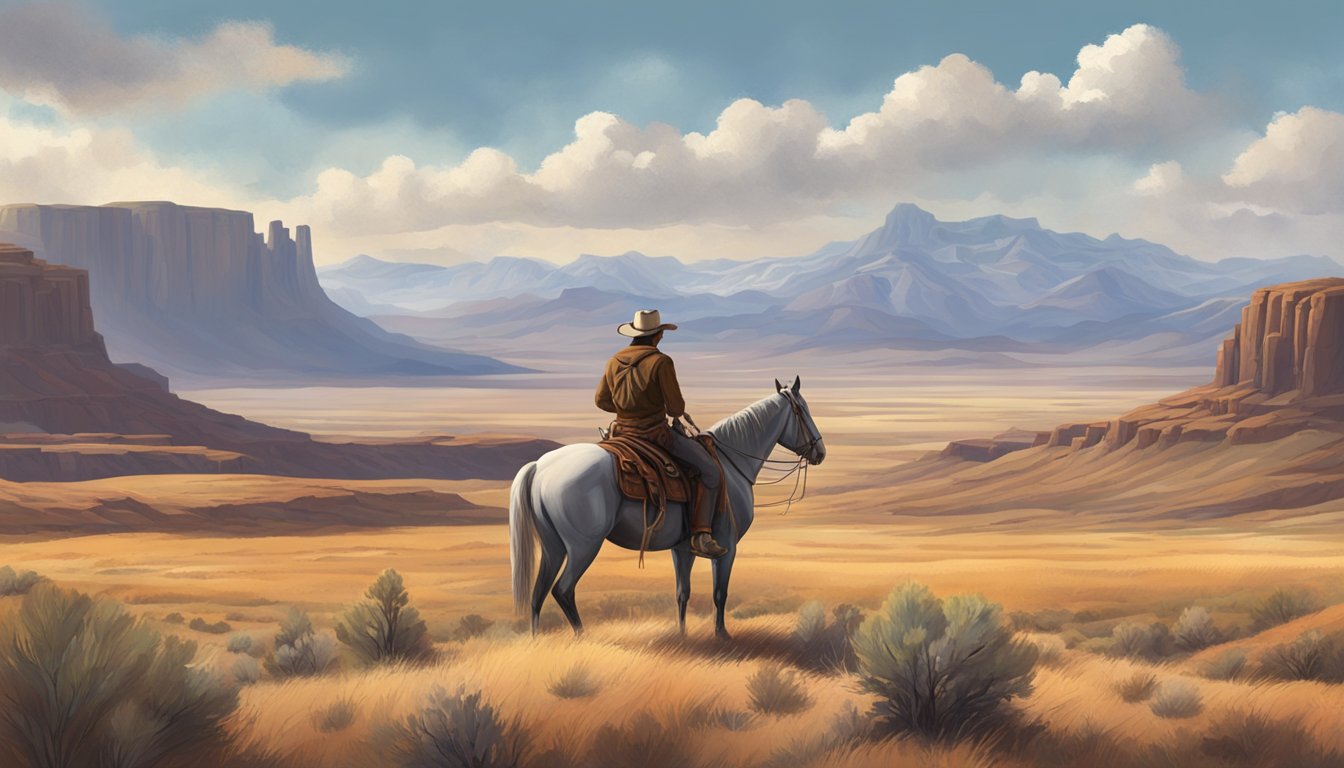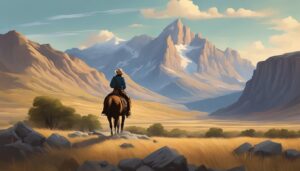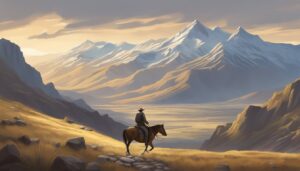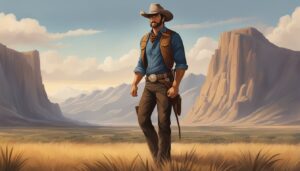Western heroes have captivated audiences for generations, with their rugged individualism and unwavering moral codes. Two iconic figures that stand out are Yellowstone’s John Dutton and The Virginian from Owen Wister’s classic novel. Both embody the spirit of the American West, but in distinctly different ways.
John Dutton, portrayed by Kevin Costner in the hit series Yellowstone, is a modern-day rancher fighting to preserve his family’s legacy. He’s a complex character, often walking a fine line between hero and antihero. While John Dutton’s determination and fierce protection of his land are admirable, his methods sometimes veer into morally ambiguous territory.
The Virginian, on the other hand, represents a more traditional Western hero. As the protagonist of one of the first true Western novels, he set the standard for the genre. The Virginian is a man of few words but strong principles, embodying the cowboy code of honor and justice. His straightforward approach to right and wrong contrasts sharply with John Dutton’s often complicated moral choices.
Exploring Western Archetypes

Western archetypes embody the rugged individualism and moral complexity of the American frontier. These iconic characters navigate a harsh landscape where law and justice often clash with survival and ambition.
Defining the Western Hero
The Western hero typically wears a cowboy hat and exudes a stoic demeanor. He embodies strength, self-reliance, and a personal code of honor. This archetype often stands as a lone figure caught between civilization and wilderness.
John Dutton and The Virginian represent modern interpretations of this classic hero. They face moral dilemmas that test their principles and force difficult choices. Both characters display a fierce determination to protect their land and way of life.
The Complex Nature of the American West
The American West serves as more than a backdrop; it’s a character unto itself. It shapes the heroes who inhabit it, creating a landscape where good and evil aren’t always clear-cut.
Neo-Westerns like Yellowstone explore this complexity through antihero protagonists. John Dutton’s actions often blur ethical lines, reflecting the harsh realities of modern ranching. The Virginian, while more traditional, also grapples with the changing face of the frontier.
These characters must adapt to survive in a world where old values clash with new pressures. Their struggles reflect broader themes of progress versus tradition, and the cost of maintaining one’s principles in a shifting landscape.
Profiles of Iconic Western Characters

Western fiction has produced some of the most memorable characters in American popular culture. These figures embody rugged individualism, strength, and moral complexity.
John Dutton of Yellowstone
John Dutton, portrayed by Kevin Costner in the hit series Yellowstone, is a modern take on the classic Western hero. As the patriarch of the Dutton family, he fiercely protects his vast Montana ranch from outside threats.
Dutton’s character blends traditional cowboy values with the challenges of the 21st century. He’s a skilled horseman and rancher who also navigates complex political and business landscapes. His moral code is rigid yet adaptable when family interests are at stake.
John’s relationship with his children forms a central part of his character development. He struggles to maintain control over his empire while grooming his heirs for leadership. This family dynamic adds depth to the typical lone cowboy archetype.
The Virginian: A Timeless Western Figure
The Virginian, created by Owen Wister in 1902, set the template for many Western heroes to follow. This mysterious cowboy is known only by his nickname and his Wyoming origins. He embodies the ideal of the honorable gunslinger.
As foreman of Shiloh Ranch, The Virginian displays leadership, courage, and a strong moral compass. He upholds justice through his actions rather than empty words. His character arc involves romance with a schoolteacher, adding emotional depth to his stoic exterior.
The Virginian’s influence extends far beyond literature. He inspired numerous film and television adaptations, cementing his place in Western lore. His blend of toughness and principles continues to resonate with audiences over a century after his creation.
Comparative Analysis of Leadership

John Dutton and The Virginian exemplify distinct leadership styles in their respective Western settings. Their approaches to family, land management, and conflict resolution highlight the complexities of frontier leadership.
Patriarchal Roles and Family Dynamics
John Dutton heads the Dutton family with an iron will, demanding loyalty and obedience. He views his children as extensions of himself and the ranch, often blurring the lines between familial love and business interests.
The Virginian, in contrast, builds a chosen family through his relationships at Shiloh Ranch. His leadership is more collaborative, fostering a sense of belonging among the ranch hands.
Both men serve as father figures, but Dutton’s style is more authoritarian, while The Virginian’s is nurturing. This difference shapes their interactions and the loyalty they inspire in those around them.
Governance and Protection of Territory
Dutton’s governance of Yellowstone Ranch is marked by aggressive tactics to maintain control. He uses political connections, economic pressure, and sometimes force to protect his vast territory from external threats.
The Virginian takes a more diplomatic approach to safeguarding Shiloh Ranch. He relies on his reputation, negotiation skills, and strategic alliances to maintain the ranch’s integrity.
Both leaders are deeply connected to their land, but their methods of protection differ significantly. Dutton’s approach is often reactive and confrontational, while The Virginian’s is proactive and relationship-based.
Conflict and Resolution Styles
John Dutton faces conflicts head-on, often escalating situations to assert dominance. He’s not afraid to use intimidation or violence to resolve disputes, viewing compromise as a sign of weakness.
The Virginian, known for his calm demeanor, prefers to defuse conflicts through dialogue and measured responses. He uses force as a last resort, instead relying on his wit and diplomacy.
These contrasting styles reflect their different eras and personal philosophies. Dutton’s aggressive approach fits the modern corporate world, while The Virginian’s measured tactics align with traditional Western values of honor and fair play.
Cultural and Environmental Impact
John Dutton and The Virginian shaped perceptions of the American West through their portrayal of ranch life and interactions with Native Americans. Their characters influenced popular culture and sparked discussions about land use and indigenous relations.
Ranch Life vs. Settlement Life
John Dutton’s Yellowstone Ranch represents a modern take on the iconic cattle empire. The show depicts the challenges of maintaining a large-scale ranching operation in the face of development pressures and changing land use policies. Dutton’s struggle to preserve his family’s legacy resonates with viewers concerned about the loss of traditional ways of life.
The Virginian, set in the late 19th century, portrays the transition from open range to settled communities. His character navigates the conflicts between ranchers and homesteaders as the frontier closes. This earlier perspective highlights the historical roots of land disputes that still echo in Yellowstone’s contemporary setting.
Native American Representation and Relations
Yellowstone features the fictional Broken Rock Indian Reservation, adjacent to the Dutton Ranch. The show explores complex relationships between the Dutton family and tribal members, addressing issues of land rights, resource management, and cultural preservation. These storylines raise awareness of ongoing Native American concerns.
The Virginian’s era depicted Native Americans primarily as adversaries or obstacles to westward expansion. While reflective of attitudes at the time, this portrayal contrasts sharply with Yellowstone’s more nuanced approach. The evolution in representation between these two characters demonstrates changing societal views on indigenous peoples and their place in American culture.
Themes of Morality and Ethics

The Western genre grapples with complex moral dilemmas and ethical quandaries. Both John Dutton and The Virginian face difficult choices that test their principles and values.
Navigating the Grey Areas of Justice
John Dutton and The Virginian operate in worlds where the law is often inadequate or corrupt. They must make tough decisions to protect their interests and loved ones. Dutton uses his power and influence to bend rules, while The Virginian adheres more closely to a personal code of honor.
Both characters dispense their own brand of frontier justice when necessary. This raises questions about the nature of true justice in lawless territories. Their actions blur the lines between right and wrong, forcing viewers to consider the morality of vigilantism.
Loyalty, Revenge, and Betrayal
Loyalty is a central theme for both protagonists. Dutton demands unwavering allegiance from his family and ranch hands. The Virginian shows steadfast dedication to his employer and friends. This loyalty is often tested by acts of betrayal, leading to conflicts driven by revenge.
Dutton’s ruthless pursuit of vengeance against those who cross him contrasts with The Virginian’s more measured approach to settling scores. Their differing reactions to betrayal highlight the moral complexities of retribution in the Old West and modern-day Montana.
Both characters must navigate a web of shifting alliances and potential backstabbing. This creates tension and forces them to question who they can truly trust.
Supporting Characters and Relationships

Both John Dutton and The Virginian are surrounded by complex networks of family and allies that shape their stories. These relationships provide crucial support and create dramatic tension.
Family Bonds and Rivalries
John Dutton’s family is at the heart of Yellowstone’s drama. His children Beth, Jamie, and Kayce each play pivotal roles. Beth Dutton is fiercely loyal but volatile, often clashing with her adopted brother Jamie. Their sibling rivalry drives many plot points.
Jamie Dutton struggles with his place in the family, torn between ambition and duty. This internal conflict leads to betrayals and reconciliations throughout the series.
Kayce Dutton, a former Navy SEAL, balances his responsibilities to the ranch with his own young family. His relationship with John is sometimes strained but rooted in mutual respect.
Key Allies and Adversaries
Rip Wheeler stands out as John Dutton’s most trusted ally in Yellowstone. His unwavering loyalty and ruthless efficiency make him indispensable to the ranch’s operations.
The Virginian’s world is populated by colorful frontier characters. His best friend Steve serves as a loyal sidekick and comic relief. Trampas starts as an antagonist but becomes a close friend and ally over time.
Both protagonists face formidable enemies. John Dutton contends with land developers, rival ranchers, and corrupt politicians. The Virginian regularly confronts outlaws, cattle rustlers, and other threats to his community.
The Role of Storytelling

Compelling narratives and character development are crucial elements that distinguish impactful Western dramas. The creative vision and execution behind the scenes shape how audiences connect with iconic figures like John Dutton and The Virginian.
Importance of Screenplay and Direction
Taylor Sheridan’s screenplay for Yellowstone crafts a nuanced portrayal of John Dutton as a modern Western hero. The show’s direction brings depth to Dutton’s character, exploring his motivations and inner conflicts. Paramount’s backing allows for high production values that enhance the storytelling.
In contrast, The Virginian relied on episodic storytelling typical of its era. The show’s writers developed The Virginian as a straightforward hero figure over its long run.
Yellowstone season 5 continues to evolve John Dutton’s character arc. The upcoming finale is expected to further solidify his place in the pantheon of complex Western protagonists.
Both series use their respective formats to create memorable heroes. Yellowstone’s serialized structure allows for more intricate plotting and character development compared to The Virginian’s episodic approach.
Ranch Hand Life Depiction

Ranch hand life on Yellowstone and The Virginian showcases the gritty realities of working cattle operations. Both series aim to portray authentic cowboy experiences, though with varying degrees of accuracy and dramatization.
Authenticity and Representation
Yellowstone’s depiction of ranch hands like Rip Wheeler, Jimmy Hurdstrom, and Teeter offers a modern take on cowboy life. The show highlights the intense physical labor and specialized skills required for ranch work. Characters demonstrate proficiency in horsemanship, cattle driving, and animal care.
The Virginian presents a more romanticized version of the 19th-century cowboy. While it captures some authentic elements, it lacks the raw intensity of Yellowstone’s portrayal.
Both series emphasize the loyalty and camaraderie among ranch hands. Yellowstone’s bunkhouse scenes reveal the tight-knit community formed by workers living in close quarters.
The shows differ in their depiction of daily tasks. Yellowstone includes more mundane activities like fence mending and hay baling, adding realism to the ranch hand experience.
Ultimately, Yellowstone’s representation of ranch life feels more grounded in reality, despite its dramatic storylines. The series captures the complex dynamics between ranch owners and workers, providing a nuanced look at modern ranching culture.
Politics and Power

Political influence and power struggles are central themes in Western stories. Both John Dutton and The Virginian navigate complex political landscapes, wielding authority and facing corruption.
Political Landscape in Western Stories
John Dutton’s political power in Yellowstone stems from his vast landholdings and connections. He clashes with Governor Lynelle Perry, using manipulation and strategic alliances to protect his interests.
The Virginian operates in a less formal political structure but still exerts significant influence. His authority comes from his position as foreman and his reputation for fairness.
Both characters face corruption in their respective settings. John Dutton deals with corporate interests and government officials seeking to exploit Montana’s resources. The Virginian confronts lawlessness and dishonest cattle barons.
Their approaches differ. Dutton often engages in morally ambiguous tactics, while The Virginian adheres to a strict code of honor. This contrast highlights the evolving nature of power in the American West.
Cinematic Legacy

John Dutton and The Virginian have left indelible marks on Western entertainment. Their characters have shaped perceptions of the American frontier and influenced subsequent portrayals of rugged individualism in pop culture.
Influence on Pop Culture and Media
John Dutton’s character in “Yellowstone” has revitalized interest in modern Western dramas. The show’s success on Peacock and other platforms has sparked a new wave of contemporary cowboy-themed content. Dutton’s complex morality and fierce protection of his land resonate with audiences, inspiring similar characters in recent TV series and films.
The Virginian, as portrayed in the long-running 1960s TV show, set standards for the Western genre. His stoic demeanor and unwavering code of ethics became a template for future Western heroes. The character’s popularity led to numerous adaptations and homages in subsequent decades.
Both figures have influenced fashion trends, with viewers emulating their iconic Western wear. Their dialogue and catchphrases have entered popular lexicon, often quoted in everyday conversations and referenced in other media.



